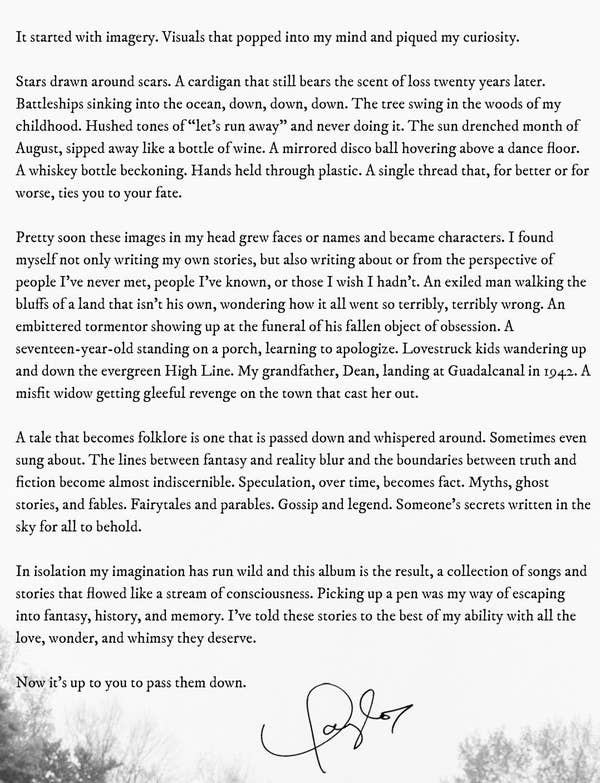I recently re-watched Taylor Swift’s Tiny Desk concert from last October. It’s crazy how much can change in a year. Before launching into her final song of the set, she thanks her audience for cramming into the tiny office space to see her perform. “I understand the sacrifices that have been made for me today,” she jokes.
I can’t help but panic a little at how sandwiched together everyone is, and then panic again when I remember that I have no idea when I will get to cram in next to a bunch of people and scream song lyrics again. But for now, at least I have the Taylor Swift Tiny Desk on YouTube.
I’m excited for the final song before it begins, as I’ve already watched this video a million times. It’s my favorite -- and probably your favorite -- and also Taylor’s favorite (on Red at least): “All Too Well.”
“Here’s a sad song about fall,” she says. Laughter. Then complete silence. Then a familiar C chord.
I think it’s something really special when a fanbase’s collective favorite song is a devastating ballad about a failed relationship. As Taylor alludes to in her Tiny Desk show, almost every internet ranking of her songs casts “All Too Well” in the number one spot. So why does this song, which was never released as a single and is essentially five and a half minutes of ripping your heart out of your chest voluntarily, resonate so deeply for so many people?
It’s the storytelling: the reason Taylor Swift became a household name in the first place. It’s in the details -- the cold autumn air, the forgotten scarf, the photo album on the counter. “All Too Well” might not have happened to us, but it feels like it did. And that’s Taylor’s superpower.
In many ways, this year’s release of folklore could be seen as a return to classic Swiftian storytelling: carefully crafted lyrics, stripped down mixes, heartbreaking narratives. But Taylor’s newest record is actually a retreat -- in every sense of the word.
Where Red and so many Swift albums of the past have felt like a peek at Taylor’s diary, folklore is coy and calculated. When the album dropped (basically out of the sky) back in July, I remember frantically texting my fellow Swiftie friends in our group chat, “DID TAYLOR AND JOE BREAK UP?!,” after hearing the opening track, “the 1,” in which Taylor sings, “But we were something, don’t you think so? Roaring twenties tossing pennies in the pool, and if my wishes came true, it would have been you.” As fans who have been following Taylor’s tumultuous love life through her song lyrics since middle school, we were naturally concerned.
However, as the album went on, we got more and more confused. Take the next track: “cardigan.” On first listen, the song sounds obviously autobiographical; the first verse seems to point at her different “eras” throughout her prolific career, from the “vintage tee” of the 80’s inspired 1989 cover art to the “black lipstick” of her dark and moody reputation aesthetic. Since Taylor was consistently dismissed as a love sick teenager in the early days of her career, the line, “When you are young, they assume you know nothing,” seems to reference the self-inflicted muzzling she talks about in her 2019 documentary, Miss Americana. In the film, Taylor shares how she was told to keep her political beliefs to herself if she wanted to keep her career: “A nice girl smiles and waves and says thank you. A nice girl doesn’t make people feel uncomfortable with her views,” she recites.
Reputation Tour, 2018-2019
But in the chorus, Taylor changes her tune: “But I knew you, dancing in your Levis, drunk under a street light. I knew you, your hand under my sweatshirt, baby, kiss it better.”Ah, so this is a love song! As the album continues, it becomes apparent that this song is part of what Taylor has called her “teenage love triangle,” as the “cardigan” appears again as a motif in the song, “betty,” a track written from the perspective of a teenage boy (or, possibly, girl) apologizing to their ex-girlfriend for their mistakes that echos teenage Taylor’s country past.
As Taylor herself explained in her album primer, folklore is unique -- at least for a Taylor Swift album -- in that its songs are told from many different perspectives, from characters she’s “never met, people I've known, or those I wish I hadn't.” This isn’t just significant because it’s a change in her artistry: it’s a deliberate retreat from the spotlight. Like Eliza Hamilton in “Burn,” Taylor is “erasing herself from the narrative.” However, it might be more accurate to say that she is camouflaging -- scrambling her stories and anonymizing her characters to protect her privacy.
Via Twitter, @taylorswift13
While once notoriously open about the intimate details of her personal life, including her romantic relationships, Taylor has become extremely private in recent years -- which is impressive, given the magnitude of her celebrity. Instead of discussing her breakups on Ellen, as she famously did as a teenager, Taylor has chosen to keep close-lipped on her personal life -- except within her music. That is, until folklore.
Folklore not only deals with escapism thematically; it is quite literally an escape from the constraints of confessional pop songwriting. While she once sacrificed her privacy to create masterpieces like “All Too Well,” Taylor has discovered a way to maintain the details and intimacy that made her previous records so compelling while never telling us who the story is about or who is telling it. We are left to guess which songs are autobiographical and which ones are fictional. And that’s okay. In fact, it’s kind of brilliant.
No song exemplifies Taylor’s retreat from autobiographical narrative better than “the lakes,” a bonus track that was originally only available on physical copies of the album. “The lakes” is inspired by Romantic poets like Wordsworth and Coleridge, who lived in England’s Lake District to retreat from society into nature. Taylor identifies with these writers of the past, singing, “Those Windermere peaks look like the perfect place to cry. I’m setting off, but not without my muse.”
Windermere, Lake District, northwest England
“The lakes” is fascinating because of how self-aware it is. It’s the writer taking back control of her own narrative, laying her old image to rest so she can remain in private bliss with her longtime partner. It’s the perfect final message to close the album with: her life is not an open book anymore, and she’s happier that way.
Note: Without “the lakes,” folklore ends on the haunting “hoax,” teasing listeners with a ballad about a failing relationship before ending on a more positive note, scrambling the narrative yet again.
Now, I could spend hours decoding lyrics and connecting dots and trying to decipher every storyline in folklore line by line. And sometimes, I’ll be honest, I’m guilty of that (fangirl habits die hard, and I’ve got to admit I miss deciphering the codes she used to leave in the printed lyrics in her CD booklets). But I’d much rather appreciate folklore for what it is: a brilliant body of work from an artist expanding her creative boundaries. And while this pandemic has taken far too many things away from us, I’m glad it gave us this.
Thank you for reading! See you next week.
<3 Jen
PS: If you’re interested in learning more about the history of confessional pop and female singer-songwriters in the music industry, I spent a year researching those topics! Check it out if you’d like!






Amazing!